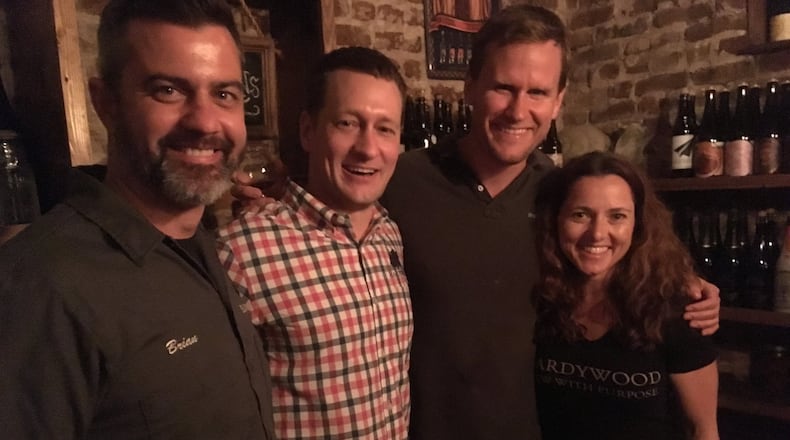Virginia's Hardywood Park Craft Brewery recently announced the expansion of its distribution network into the metro Atlanta area.
The move came on the heels of the April opening of its new $28 million state-of-the-art West Creek brewing facility outside of Richmond, where the company was founded in 2011.
Currently Hardywood beers are sold in Virginia, Washington, D.C., and eastern Pennsylvania, along with some international markets, including the United Kingdom.
Among the flagship beers set to come to Atlanta initially, look for Single Belgian Abbey-style Blonde Ale, Pils German-style Pilsner, and VIPA (Virginia Pale Ale) IPA.
But the fruited and aged beers in Hardywood’s Virginia Roots and Barrel-Aged series, which include the likes of limited edition Virginia Blackberry and highly rated Gingerbread Stout, are what many aficionados are hoping to see in the future.
Like many small American craft breweries, Hardywood has an origin story that leans heavily on the personal experiences of its founders and brewers.
Last week, the core of the Hardywood team — its co-founders, Eric McKay and Patrick Murtaugh, vice president of production, Brian Nelson, and vice president of operations and quality, Kate Lee — landed at the Porter Beer Bar in Little Five Points.
Ensconced in the Porter’s dimly lit vintage beer cellar, which doubles as a private dining room, the foursome greeted media and a few Atlanta family and friends to tell some of those stories.
“Our credo is Brew With Purpose,” McKay said. “Purpose for us means quality, and taking care of the environment. We’re the first renewable energy-powered brewery in the Southeast. It means giving back. We’ve given over $200,000 to local and regional charities in the places that we do business.
“It also means community engagement, which is events like this, where we get to meet folks and hear their insights and learn from them. One of things that we all really love about craft beer is how it brings people together. And how it is a catalyst for telling fun stories.”
As it turns out, McKay and Murtaugh were childhood friends, who later got into different sides of the beer business before opening Hardywood.
The beginnings of their business partnership go back to a 2001 trip to Australia, at a working farm called Hardywood Park, where they sampled the owner’s homebrewed ale and decided that was something they wanted to do, too.
McKay, who serves as president of the company, worked in sales and marketing for Union Beer Distributors in New York City, where he was introduced to the wide world of European and American craft breweries and developed an appreciation for a variety of styles.
Murtaugh, who is the brewmaster, comes from a family that includes three generations of brewmasters. He studied at the Siebel Institute of Technology in Chicago, before moving to Munich, where he trained at Germany’s Doemens Academy and earned his Master Brewer Certification.
After the talk and tasting session at the Porter, I asked McKay about growing Hardywood in Virginia and opening up the Atlanta market.
“The big reason we chose Virginia was that the market share there was really low; there was one brewery in the market in operation then,” McKay said. “Now there are 35. When we opened, there were something like 1,000 craft breweries in the U.S. Now there are over 6,000. From the beginning, we started Hardywood to become a regional distributing brewery. But it’s tough now. It’s competitive.
“Looking at opportunities to expand, we looked at both cities and states where there may be opportunities for growth. In density of breweries per capita, Georgia is pretty low. For us, planting a flag in Atlanta was very purposeful. Our long-term goal is not to become a national brewery. It’s to become a brewery that’s relevant, and recognized, and appreciated in the Southeast.”
In a craft market dominated by American IPAs, I wondered how Hardywood’s lighter Belgian-style Blonde and German-style Pilsner might do in Atlanta.
“Atlanta Beverage and Eagle Rock, our distributors here in the Atlanta market, had fairly streamlined portfolios, and were both kind of lacking an American-made, American-owned craft Pilsner,” McKay said. “So that was appealing, and will probably be a lead for them.
“And they both have opportunities for beers made with fruits and other ingredients from local farms, and barrel-aged beers. Those are all things that we thought would resonate in this market, too.”
MORE:
Read more stories like this by liking Atlanta Restaurant Scene on Facebook , following @ATLDiningNews on Twitter and @ajcdining on Instagram .
About the Author
The Latest
Featured


